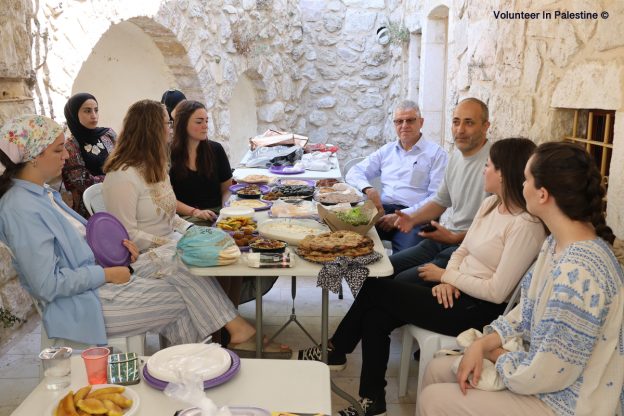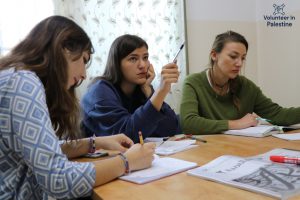Stay with a Palestinian Host Family: Thousands of people travel to Israel and Palestine every year, but if you want to experience everything that the West Bank offers, there are few better ways to do so than by staying with a Palestinian host family.
While staying with a Palestinian host family, you will have the opportunity to experience Palestinian culture in a way that few others will get to do. In this way, you will experience Palestine the way Palestinians do. With limited opportunities for travel themselves, Palestinians are often eager to meet visitors from overseas and to share something of their own culture with them. Why not see real Palestine while staying with a Palestinian host family?
Table of Contents
Why Choose A Home Stay?
Palestinian culture is rich and diverse, having been influenced by numerous empires throughout history. Today, Palestine continues to play a major role in the life and politics of the Middle East and the world at large. For students of history, political science, anthropology, Arabic, or anyone interested in Palestinian culture and society, staying with a host family will greatly expand their knowledge of these topics. A homestay is a great way to immerse yourself in Palestinian culture!
Engage in Palestine runs various volunteer and educational programs, with topics as varied as Arabic language courses, medicine and healthcare, music and the arts, Palestinian culture, research and fieldwork, English language classes for Palestinians, women’s and children’s rights, and media and journalism. In addition to opening a door to Palestine for international participants, these programs also allow Palestinians to connect with people worldwide. Volunteers, interns, and students are allowed to live with a Palestinian host family and enroll in complimentary Arabic classes as part of their program.
If you are not interested in enrolling in any of the aforementioned programs, the Home Stay in Palestine Program should satisfy your explorer’s spirit, as it will give you the opportunity to learn about Palestinian culture through the lens of the daily life of a Palestinian family. During their stay, participants will have the opportunity to travel throughout the West Bank while enhancing their Arabic language skills, therefore becoming completely immersed in the local culture. The Palestinian family that you will be staying with will be eager to meet visitors like you!
Living The Arabic Language
When traveling abroad for extended periods of time, many people end up “living the Arabic language”, meaning that they begin to learn the local language purely through assimilation. This also holds true when staying with a host family, as the family’s limited English means that participants will be putting the Arabic that they have been learning into practice.
By choosing a homestay in Hebron, participants will get to experience the local dialect of Arabic. For example, they will learn colloquial phrases that they would almost never come across in a classroom. These kinds of phrases abound in the daily life and customs of Palestinians and are used continuously in various situations. For instance, the word “thank you” in Arabic may be used in one interaction to offer gratitude, while in another, it may mean “no” when declining an offer.
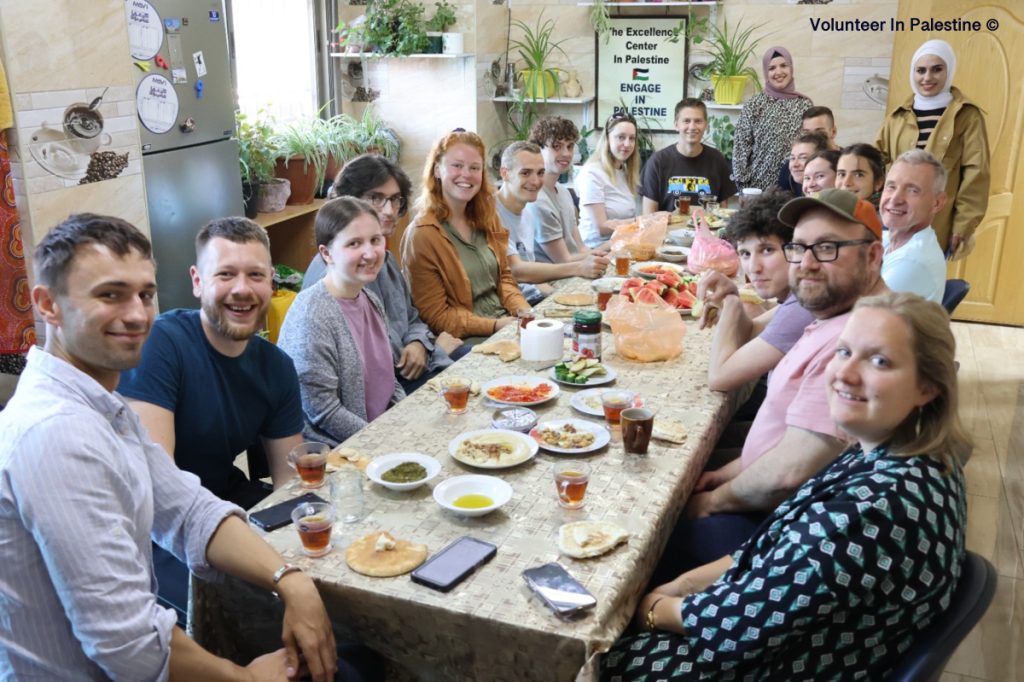
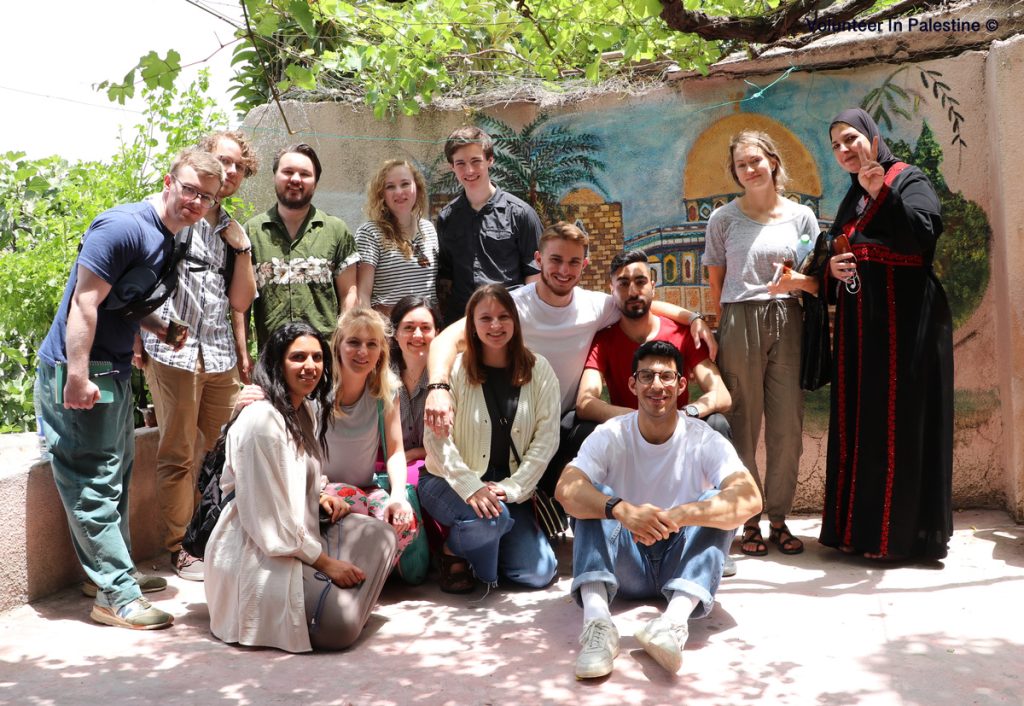
For those who have already learned Arabic through formal education, this program would be an ideal opportunity to exercise their Arabic skills. Not only will you be speaking Arabic when out and about, but you will also be using it in the home. By staying with a Palestinian host family, students of Arabic will become more comfortable and competent when using the language. This may be while traveling, shopping, or conversing with locals, and you will ultimately see yourself articulating your own thoughts and opinions in Arabic. Staying with a Palestinian host family is one of the most enjoyable ways to become a seasoned Arabic speaker!
Becoming Rooted In Hebron
Engage in Palestine prides itself on its community ties and connections in Hebron. These connections make our Center’s mission possible; without them, we could not connect people with the local NGOs, businesses, and charity organizations we routinely collaborate with.
When on a homestay in Palestine, participants will be invited to come along on Center-led excursions in Hebron. These excursions are part of the Center’s efforts to connect visitors with local Palestinians while allowing them to view the country from a more intimate historical, cultural, societal, and political standpoint. Site visits include national parks, historical sites, refugee camps, local law firms, universities, NGOs, government offices, restaurants, and more!
Those residing with host families will often be invited to participate in family events, dinners, and celebrations. Palestinians are famed for their hospitality, and as their guest, you will be shown immeasurable kindness and warmth. For many first-time visitors to Palestine, Palestinian generosity is one of the things that they find most endearing, and this holds especially true when in a home setting. Hospitality is a cornerstone of Palestinian culture; without it, a host is not considered to be living up to expectations.
As a guest in a Palestinian home, you will also have the opportunity to connect with local Palestinians outside of your immediate host family’s circle. On Fridays, for instance, families often invite guests, friends, and neighbors around for evening meals. These occasions will provide participants with plenty of opportunities to meet and connect with new people while also practicing their Arabic.
How Do We Choose Our Host Families?
Because of our deep connections with the local community of Hebron, the Center is acquainted with many Palestinian families who are now firmly rooted in our homestay program. Every host family selected by the Center has been thoroughly vetted and interviewed to ensure that their overall ability to care for and welcome their guests to Hebron has been well-established. Most families have been participating in our programs for years and are trusted community members.
Benefits Of Staying With A Palestinian Host Family:
- Become acquainted with Palestinian daily life
- Experience full Arabic language immersion
- Travel through the West Bank while being based in Hebron
- Explore Hebron’s many sites through Center-led excursions
- Experience the warmth and hospitality of a Palestinian family
Previous Home Stay Experiences
Below are some stories from volunteers, interns, and students who stayed with a host family during their time in Palestine. Read about their experiences to see if residing with a Palestinian host family is right for you!
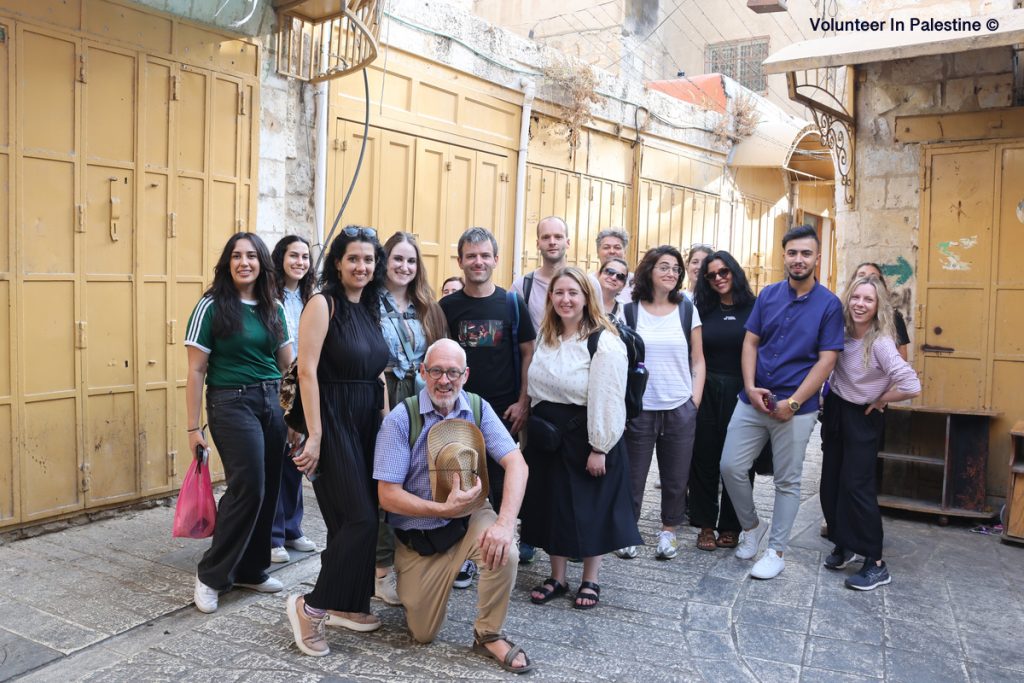
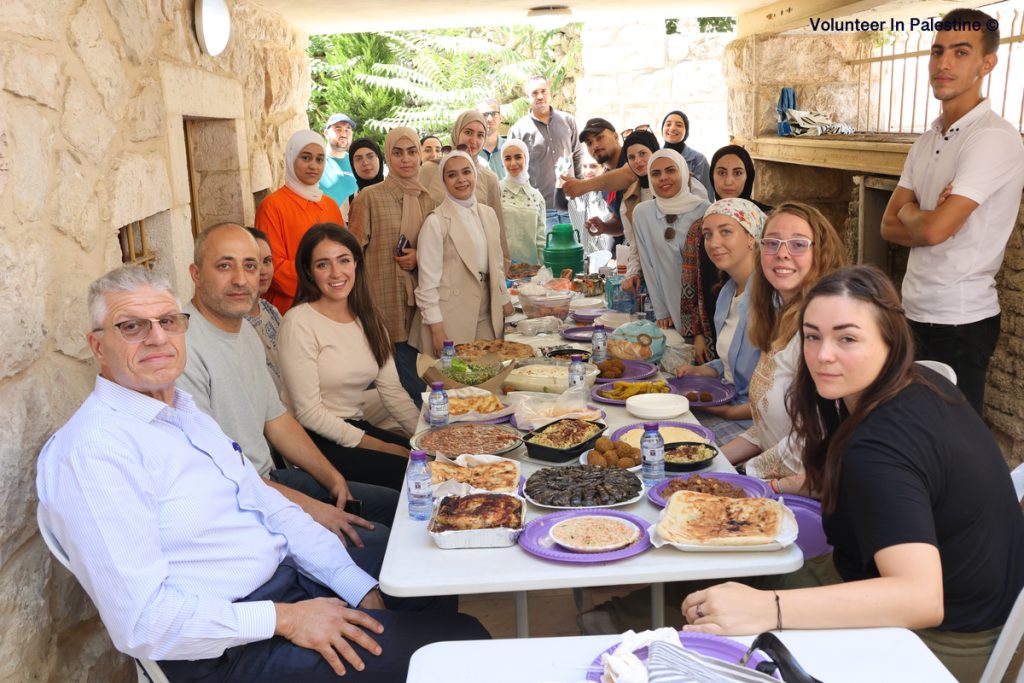
Alexa, USA:
“My host mother is so sweet and loving. She constantly tells me that she has five daughters but that now I am her sixth.”
Irene, Spain:
“The best thing about living with a host family is all the nice moments you share together with them. I love how sometimes, when I stay up reading in my room late at night, my host family comes up and gives me a cup of tea; it’s very sweet. Only one person in my family speaks English, so I also get a lot of chances to practice my Arabic, and since I participate in their daily routines, I get to learn a lot of Arabic phrases that I might not have learned in a classroom setting.”
Maud, France:
“When I arrived in Hebron and was introduced to my new family, I could see on their faces that it was an honor for them to host me. Both parents and their two sons, Laith and Moisa (15 and 16 years old) made me feel instantly at home. I also was immediately involved in their daily life. I never felt that I was disturbing them, and their generosity was unbounded, as they kept telling me how happy they were to have me in their home.
The youngest son was only too willing to show me how to use public transportation to Engage in Palestine, whilst the eldest son acted as the family translator. My host mother has taught me how to make a number of traditional Palestinian dishes, and my host father insisted on buying me new clothes, just as he does for his sons for the celebration of Eid.”
When exploring an unfamiliar place, learning a new language, and experiencing a foreign culture for the first time, returning to a comfortable and welcoming environment can be reassuring every evening. Additionally, your host family is there for you should you have any questions or need assistance with anything, and we at the Center will also be available to support you.
Sites To See
Palestine is home to many world-famous historical and cultural sites. Also known as the Holy Land of the three Abrahamic religions of Christianity, Judaism, and Islam, this landscape hosts many settings of religious significance.
Many people who have grown up in the Judeo-Christian tradition are familiar with the city of Bethlehem and would be excited at the prospect of visiting the Church of the Nativity, so-called as it is believed to be the exact spot where Jesus was born. Jerusalem is home to the beautiful and world-renowned Dome of the Rock, which sits within the Al Aqsa compound along with the Al Aqsa Mosque, which is the third holiest site in Islam.
The Western Wall is adjacent to the mosque, the holiest site in Judaism, and all that remains of the Second Temple. Finally, we have the Church of the Holy Sepulcher, which sits not far from Temple Mount and is believed to be the site of Jesus’ crucifixion.
However, you do not need to leave Hebron to find important religious and historical sites. Right here in the Old City is the Ibrahimi Mosque, which is believed to hold the remains of the prophet Ibrahim (or Abraham) and his wife Sarah and carries religious significance for Jews and Muslims. It is also of huge historical and political significance to Palestinians, as it was the site of a large-scale massacre against Palestinian Muslims during predawn prayers in 1994.
The Center operates regular group excursions into Hebron and other cities within the West Bank in order to give visitors a better idea of what life is like in Palestine. We regularly visit the local TV station headquarters, for instance, as well as news outlets, universities, law offices, refugee camps, and religious and historical sites. It is also likely that host families will invite their guests to various festivities such as weddings and cultural events!
Things To Keep In Mind
Meals
Even though Palestinian host families that are partnered with Engage in Palestine are not obliged to provide regular meals, program participants often find that their hosts will offer them food in the evenings and on weekends. It is unusual in Palestinian culture to refuse food unless you have specific dietary restrictions. When staying with a Palestinian host family, be prepared to explore the diverse and wonderful world of Palestinian cuisine and food culture. If you are not planning to return home until late in the evening, it is normal practice to inform your host family ahead of time, as a place at the table may have been set for you.
Palestinian culture is also famed for its hospitality, and this is especially true in a family environment. As the mark of a good host, families will offer a plentiful supply of food, coffee, and tea to their guests in an effort to make them feel welcome. If the amount of food and drink being offered becomes overwhelming at any time, the polite response is to say “Alhamdulillah,” which means “praise be to God.” The phrase is used in this specific instance to politely compliment the meal and express your inability to eat anything further. All in all, as a guest in a Palestinian home, be prepared to eat a lot.
Dietary Requirements
Meat is a staple of Palestinian cuisine, and the vast majority of Palestinians enjoy meat and other animal-sourced products on a daily basis. Vegetarians and vegans should, therefore, let us at Engage in Palestine know of their dietary requirements ahead of their visit.
Palestinian families will have no problem accommodating your dietary requirements if informed beforehand. For those who abstain from meat, please make sure to confirm that you do not eat fish either, as in Palestinian culture, fish and other types of seafood are not viewed as meat.
Palestinian Generosity
Generosity, especially towards guests, is a cornerstone of Palestinian culture. Even if food is scarce, Palestinians will still invite you. For a guest of a Palestinian household, it is considered polite to accept this offering.
In turn, we recommend that participants bring gifts for their host families; items from back home are always valued and appreciated. In this way, families will be encouraged to share more aspects of their lives with you, which is always a sign of a good cultural exchange.
Be Respectful Of House Rules
Palestinian host families are patient teachers so that you will learn house rules quickly. If you are ever in doubt about anything – whether it be meal times, how to operate the washing machine, or when you are expected to be home – please do not hesitate to ask. Palestinians will always try to accommodate all of their guest’s needs.
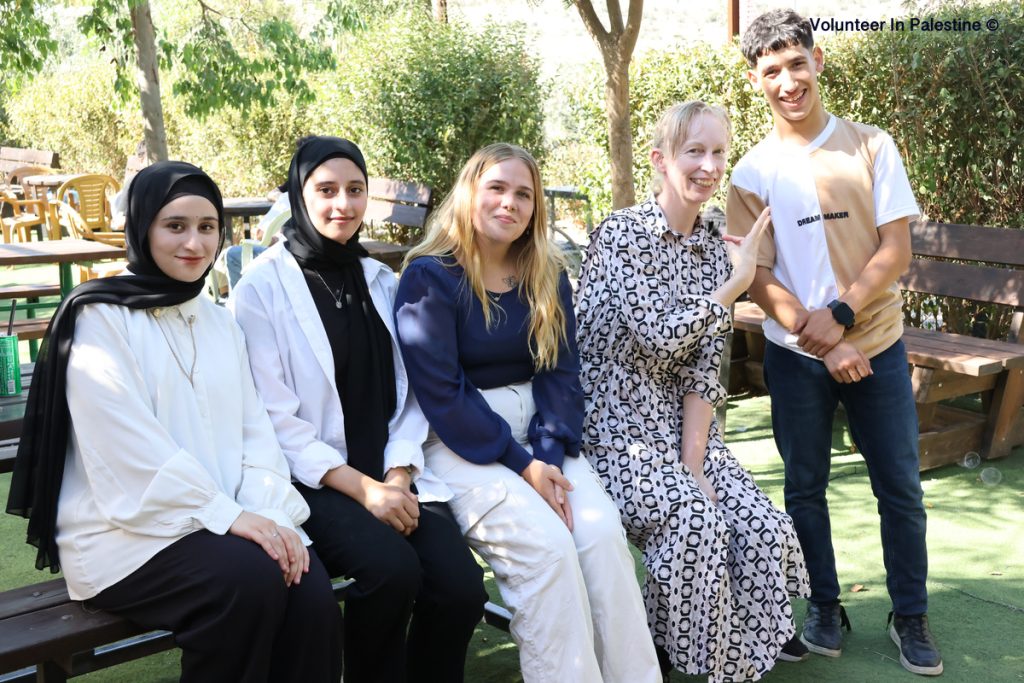
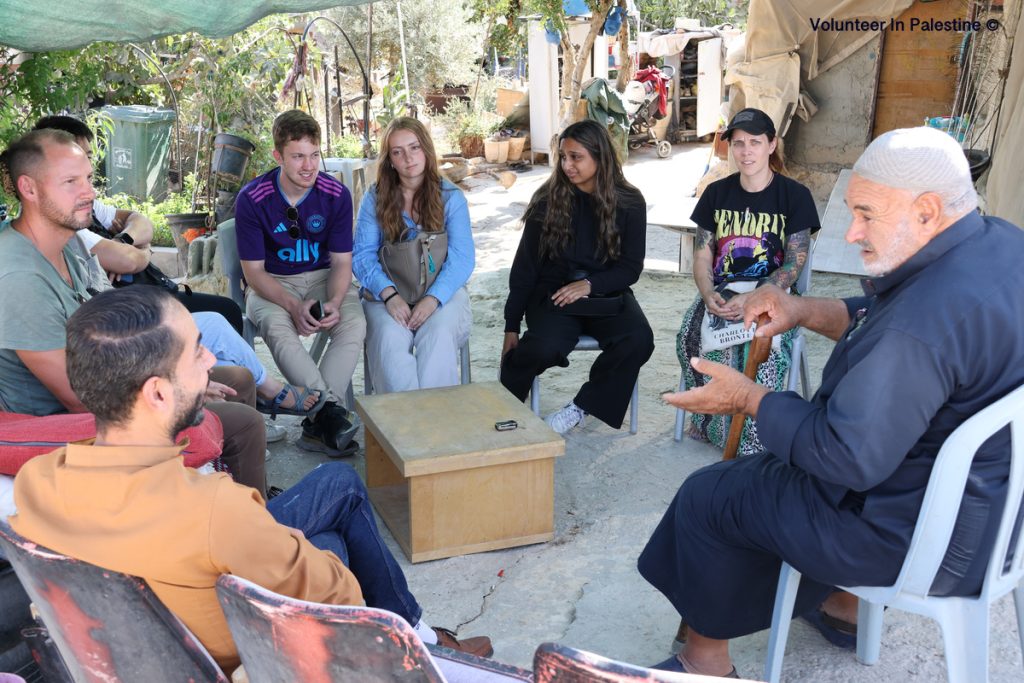
You must have the contact information of at least one household member and that they, in turn, have yours. You should always confirm with your host family when you intend to invite a friend over for coffee or dinner, and female participants, in particular, should inform their host families if they intend to return home later than usual.
Events And Gatherings
It is not uncommon for guests of host families to be invited to events and celebratory occasions while in Palestine. On Fridays, especially, families often invite friends and loved ones over for large meals. Be prepared to eat plenty of Maqluba, Mansaf, Musakhan, and other traditional dishes during your stay.
Dress Appropriately
Engage in Palestine advises participants to be mindful of the culture and customs of the country where they will stay. Palestine is a Muslim-majority country, and as such, the style of dress is quite modest.
Hebron is regarded as the most conservative city within the West Bank. Therefore, both male and female participants should remember that clothing appropriate in other countries may not be so here.
Out And About
Men should refrain from wearing shorts and tank tops. However, short-sleeved shirts are fine as long as they cover the shoulders. On the other hand, women should refrain from wearing short-sleeved shirts, ensuring that their arms and legs are covered down to their ankles.
Cleavage or any low-cut tops are unacceptable, though this may be easily remedied by pairing your favorite camisole with an undershirt or scarf. While it is common in Western countries for women to wear leggings, skin-tight clothing such as Lycra leggings should not be worn.
At Home
Participants should be aware of fluctuating temperatures and changeable weather in this region. Cities like Hebron and Jerusalem are at a high elevation, making them susceptible to some snowfall during the winter.
Even though it is located in the Eastern Mediterranean, temperatures during the fall and winter in Palestine can drop to 3˚C (about 38˚F), with wind and rain continuing into the early springtime. Houses in this part of the world are not normally insulated, and because they are mainly built using concrete, it can become quite cold inside, even on warm, sunny days. Therefore, it is best to consider the season you will be traveling and pack warm clothing if necessary.
When walking through the family’s home, it is best to wear clothing that is not revealing or body-hugging. Loose-fitting pajama pants and a bulky sweater would be the most appropriate, both in terms of climate and culture.
Traveling To Hebron
Reaching the Center can entail a lot of traveling, but it need not be arduous. Although there are some obstacles to be overcome when traveling to Hebron, Engage in Palestine has compiled a list of the resources you will need to reach us efficiently, safely, and practically. Please read our articles below on planning your trip, flying to Palestine, the different routes to Hebron, and Israeli and Palestinian taxi services:
- How to fly to Palestine
- How to get to Hebron, Palestine
- Planning your trip to Palestine
- How to get from the Ben Gurion Airport (Israel) to Hebron
If you have any further inquiries about travel to Palestine, please do not hesitate to contact our team. Our contact information can be found at the bottom of this page.
Who Can Participate?
Engage in Palestine does not discriminate on any basis; this includes nationality, ethnicity, religion, gender, sexual orientation, or any other basis. We have a long history of welcoming people from around the globe from all walks of life, backgrounds, and identities. All are welcome!
Previous participants on our programs have hailed from the following countries: Australia, Austria, Belgium, Brazil, Bulgaria, Canada, China, Croatia, Cyprus, the Czech Republic, Denmark, Estonia, Finland, France, Germany, Greece, Hungary, Ireland, Italy, Japan, Latvia, Lithuania, Luxembourg, Malta, Mexico, the Netherlands, New Zealand, Norway, Poland, Portugal, Romania, Singapore, Slovakia, Slovenia, South Africa, South Korea, Sweden, Switzerland, the United Kingdom and the United States!
Are There Any Criteria For Participants?
There are only 3 criteria for participants, the first being conversational fluency in either of the program languages (English or Arabic). Secondly, participants should be between the ages of 18 and 70, although exceptions can be made in special circumstances. Finally, we asked participants to have a positive attitude and an eagerness to learn.
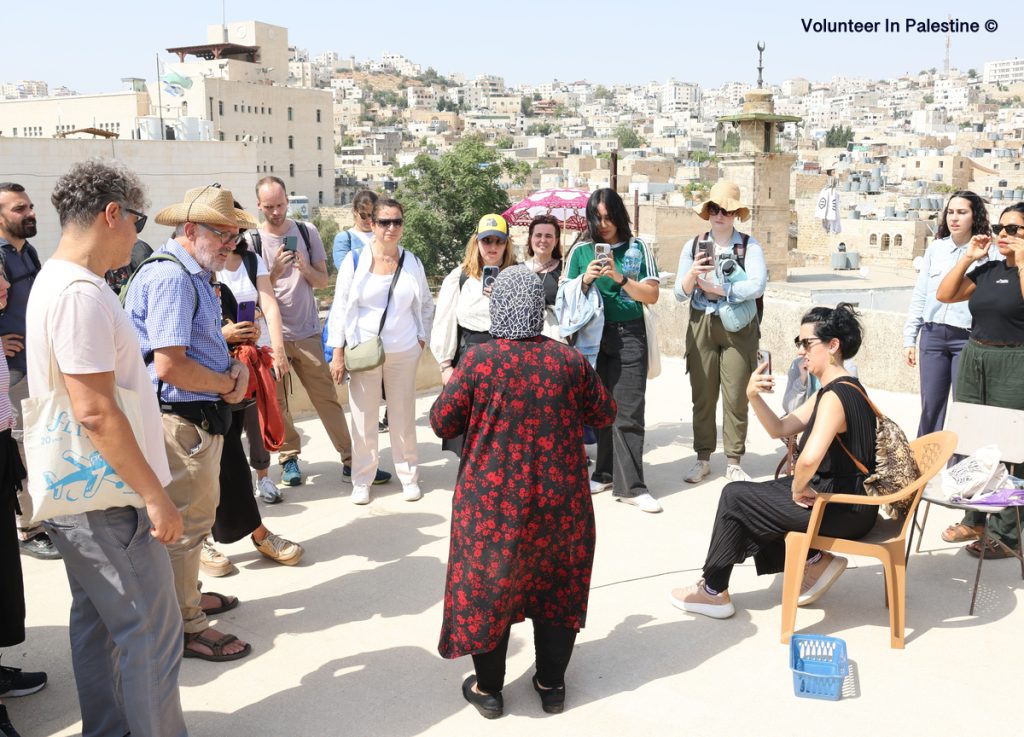
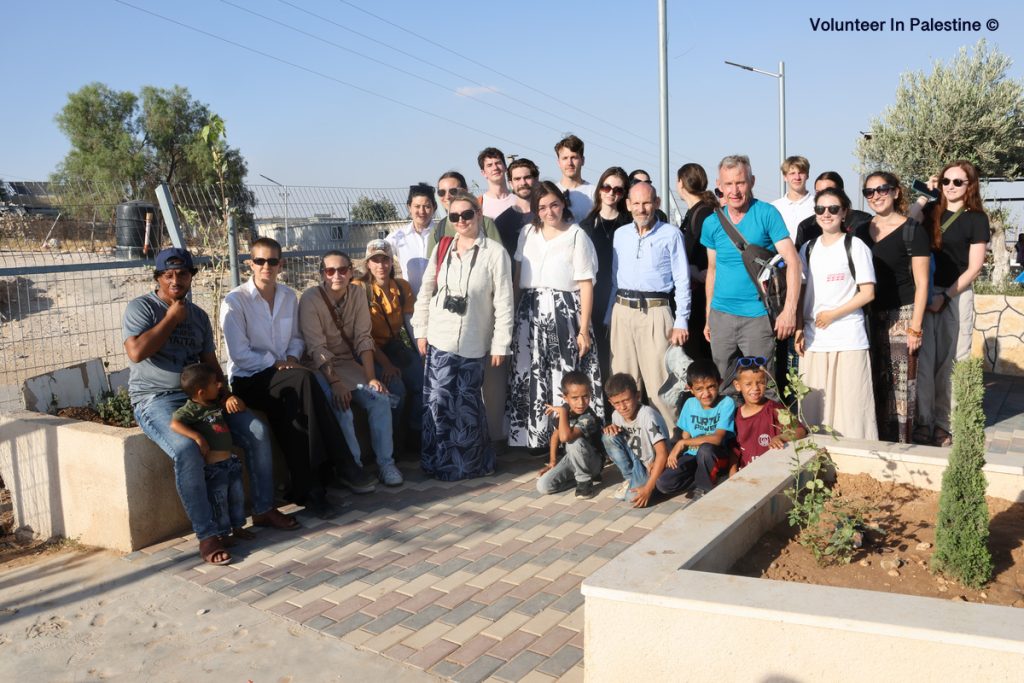
Participant Requirements
- Colloquial fluency in English and/or Arabic
- 18-70 years of age (unless granted special permission by the Center’s director)
- A positive attitude and an eagerness to learn
Program Costs And Components
| Program Location | Hebron, Palestine |
| Home Stay Fees | 30 Euros per night |
| Age Limit | 18-70 years old |
| Program Focus | Stay with a Palestinian host family Home Stay in Hebron, Palestine |
| Minimum Duration | 1 day |
| Maximum Duration | 4 weeks |
| Arabic Lessons Per Week | 3 hours in total |
| Start/End Dates | Flexible to fit participant’s schedule |
| Application Deadline | No Deadline |
Program Reviews
Volunteer in Palestine has been honored with several prestigious Community Awards and recognized as the Best Language School and Top Volunteer and Internship Program Provider for 2019, 2021, 2022, and 2023. For more details, please visit our profiles on GoOverseas.com and GoAbroad.com.
- 850+ Reviews (96%) on Gooverseas.com
- 170+ Reviews (94%) on Goabroad.com
- Participants’ video testimonials
Summary
Residing with a Palestinian host family in Hebron can be a rewarding and eye-opening experience, as participants will experience another country’s life, culture, and customs in an intimate and unique way.
Staying with a host family will also help participants better understand the Palestinian way of life and their close connection to their homeland. If this cultural and linguistic immersion level sounds good to you, do not hesitate to contact us!
How to Apply
If you are interested in hosting family accommodation in Hebron, please email us at Info@ecpalestine.org. We should be able to respond to your initial inquiry within 1-3 business days.
In the subject line of your email, write “Home Stay in Hebron.” Upon responding, we will attach an application form, which you can then fill out and return to us to begin the process.
Contact Us
Should you have any more questions about coming from Ben Gurion Airport (Israel) to Hebron, please do not hesitate to contact us at:
WhatsApp:+972 599 479 880
Website: https://volunteerinpalestine.org/
Website: https://excellencenter.org/
Instagram: https://www.instagram.com/excellence.center
Facebook page: https://www.facebook.com/ExcellenceCenter
